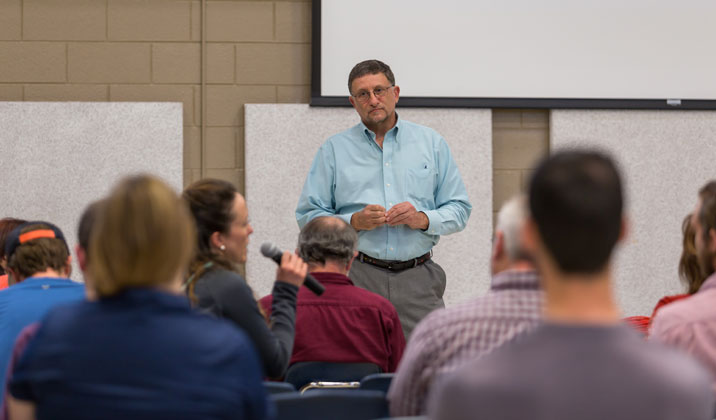
Mitch Kessler with Kessler Consulting listens while residents introduce themselves during a public input session to discuss the city’s recycling goals held Wednesday evening at Woodland Junior High School.
Photo: Todd Gill, Fayetteville Flyer
Fayetteville’s goal to expand municipal recycling won’t come quick and it won’t come easy.
The city is looking to increase its trash diversion rate from 18 percent to 80 percent, a target consultants said is extremely ambitious.
About 40 residents and city officials attended a public input session Wednesday evening at Woodland Junior High School to discuss the city’s goal, along with Mitch Kessler and Robin Mitchell from Kessler Consulting.

Residents and business owners are asked to complete an online survey about the city’s trash and recycling master plan. The survey asks people if they agree with the city’s recycling goals, and if so, which types of new programs they would support.
The city recently contracted with the Florida-based waste management company to develop a trash reduction, diversion and recycling master plan that will outline ways in which Fayetteville could reach its goal by 2025.
“Tonight you all are making history,” Mayor Lioneld Jordan told the audience. “Fayetteville has always strived to be on the cutting edge of waste diversion, and has long been known as leading the state in environmental protection initiatives and actions to benefit the environment. This leadership places our city in the perfect position to define a plan of success to lessen our dependance on landfills and the taxpayer fees that come with landfill dumping, while increasing the amount of material recycled and composted in our city.”
Kessler and Mitchell said getting to an 80 percent diversion rate is possible, but will require fundamental changes in the city’s approach to recycling.
“It’s completely flip-flopping your system,” said Mitchell. “And that is a huge undertaking.”
Last year, residents and businesses disposed of about 63,000 tons of waste. Of that total, only 5,600 tons (9 percent) were recycled and 7,000 tons (11 percent) were composted. That left about 50,400 tons of waste which was sent to the Eco-Vista Landfill in Tontitown. That number doesn’t include waste collected at the University of Arkansas.
An examination of the city’s waste content revealed that about 60 percent of what’s currently sent to the landfill could be recycled or composted.

A chart shows what percentage of each type of waste is disposed of in Fayetteville each year.
Photo: Todd Gill / Chart: Kessler Consulting
Kessler said getting to that figure, however, will likely require local and regional partnerships in both the public and private sectors.
For example, about 15 percent of those potentially salvageable materials are disposed in roll-off waste containers used by development companies when constructing new homes and buildings around town. Another 25 percent comes from local businesses, including apartment owners. In other words, finding ways to work with those developers and businesses will be key in achieving the city’s goal.
Success may also hinge upon partnerships with other cities in the region.
Kessler said a great way to reach and sustain an 80 percent diversion rate is by working with a private waste management company to provide the necessary infrastructure to handle the increased amount of recyclable material. However, he said Fayetteville can’t do that alone.
“The bottom line is you don’t really have enough waste here to get the private sector that excited,” said Kessler. “Nobody’s going to come to Fayetteville and build a $30 million facility for recycling because 50,000 tons just doesn’t do it.”
Kessler his company has been working on the master plan project for about four months, and hopes to be finished by this fall.
Besides potential partnerships, the plan is expected to identify other programs and policy changes needed to reach the city’s goal. Suggestions could include apartment and commercial recycling, food waste collection, incentives for backyard composting, educational programs, event recycling, banning commercial plastic bags and foam cups, and transitioning to a “single-stream” recycling system in which materials are sorted at a central facility instead of at the curb.
As part of the project, city officials are asking residents and business owners to complete an online survey at recyclesomething.org. The survey asks residents if they agree with the city’s recycling goals, and if so, which types of new programs they would support.

